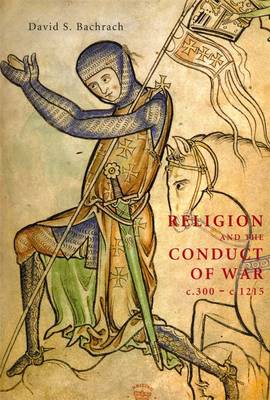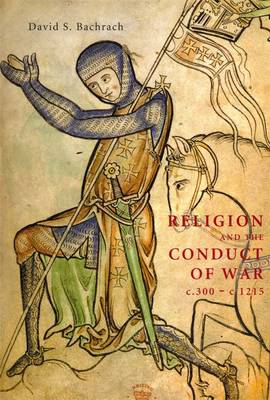
Je cadeautjes zeker op tijd in huis hebben voor de feestdagen? Kom langs in onze winkels en vind het perfecte geschenk!
- Afhalen na 1 uur in een winkel met voorraad
- Gratis thuislevering in België vanaf € 30
- Ruim aanbod met 7 miljoen producten
Je cadeautjes zeker op tijd in huis hebben voor de feestdagen? Kom langs in onze winkels en vind het perfecte geschenk!
- Afhalen na 1 uur in een winkel met voorraad
- Gratis thuislevering in België vanaf € 30
- Ruim aanbod met 7 miljoen producten
Zoeken
Omschrijving
Warfare in all histories and cultures shows evidence of the driving need to sanctify the cause, from the personal devotions of individuals to the grand designs of the architects of battle. In his important study David Bachrach takes a first thorough look at warfare in western Europe and its interaction with Christianity, from the initial appearance of the pacifist sect to the medieval popes' certainty of the crusades as 'holy war'. Religion played a necessary and crucial role in the conduct of war during late Antiquity and the middle ages. Military discipline and morale depended in significant part on religious rites carried out by priests and soldiers in the field and by their supporters on the home front. Just as importantly, warfare in the late Roman empire and its western successor states had a profound impact on Christian religious practice and doctrine: liturgical developments - in prayer, communion, confession, penance - can be linked to the military needs of the Christian Roman world and the Christian states of medieval Europe. Even more profound was the transformation of Christianity itself from pacifism to a faith which justified and eventually glorified killing on behalf of the Church.
This volume provides the first comprehensive analysis of the dynamic interpenetration of religion and war in the West during almost a thousand years, from the accession of Constantine the Great in the early fourth century until the eve of the Fourth Lateran Council in the early thirteenth. With its often new interpretations of a vast array of sources, 'Religion and the Conduct of War' has much to say to historians and others on the nature of war and its relationship with faith. DAVID S. BACHRACH is a postdoctoral fellow of the department of history at the University of Minnesota.
This volume provides the first comprehensive analysis of the dynamic interpenetration of religion and war in the West during almost a thousand years, from the accession of Constantine the Great in the early fourth century until the eve of the Fourth Lateran Council in the early thirteenth. With its often new interpretations of a vast array of sources, 'Religion and the Conduct of War' has much to say to historians and others on the nature of war and its relationship with faith. DAVID S. BACHRACH is a postdoctoral fellow of the department of history at the University of Minnesota.
Specificaties
Betrokkenen
- Auteur(s):
- Uitgeverij:
Inhoud
- Aantal bladzijden:
- 226
- Taal:
- Engels
- Reeks:
- Reeksnummer:
- nr. 16
Eigenschappen
- Productcode (EAN):
- 9780851159447
- Verschijningsdatum:
- 22/05/2003
- Uitvoering:
- Hardcover
- Formaat:
- Genaaid
- Afmetingen:
- 166 mm x 241 mm
- Gewicht:
- 512 g

Alleen bij Standaard Boekhandel
+ 354 punten op je klantenkaart van Standaard Boekhandel
Beoordelingen
We publiceren alleen reviews die voldoen aan de voorwaarden voor reviews. Bekijk onze voorwaarden voor reviews.









